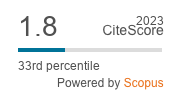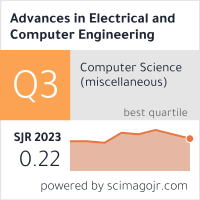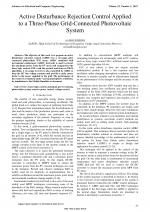| 1/2022 - 10 |
Active Disturbance Rejection Control Applied to a Three-Phase Grid-Connected Photovoltaic SystemBOUKHRISS, A. |
| Extra paper information in |
| Click to see author's profile in |
| Download PDF |
Author keywords
fuzzy logic control, maximum power tracking, photovoltaic system, reactive power control, voltage control
References keywords
energy(20), control(19), power(10), mppt(9), grid(8), system(7), renewable(7), systems(6), controller(6), wind(5)
Blue keywords are present in both the references section and the paper title.
About this article
Date of Publication: 2022-02-28
Volume 22, Issue 1, Year 2022, On page(s): 87 - 94
ISSN: 1582-7445, e-ISSN: 1844-7600
Digital Object Identifier: 10.4316/AECE.2022.01010
Web of Science Accession Number: 000762769600009
SCOPUS ID: 85126786544
Abstract
The objective of this work is to propose an active disturbance rejection control (ADRC) for a two-stage grid-connected photovoltaic (PV) array. ADRC combined with incremental conductance (ADRC_IncCond) is used to extract the maximum power from the PV array and compared to the fuzzy logic control (FLC) and the perturb and observe (P&O) algorithm. A two-stage inverter is also controlled by ADRC to keep the DC bus voltage constant and provide a unity power factor to the power supplied to the grid. The performance of the control is evaluated, under varying atmospheric conditions, by simulations in the Matlab Simulink environment. |
| References | | | Cited By «-- Click to see who has cited this paper |
| [1] G. Carrington, J. Stephenson, "The politics of energy scenarios: are international energy agency and other conservative projections hampering the renewable energy transition?," Energy research & social science, vol. 46, pp. 103-113, 2018. [CrossRef] [Web of Science Times Cited 52] [SCOPUS Times Cited 58] [2] E. Asmelash, G. Prakash, R. Gorini, D. Gielen, "Role of IRENA for global transition to 100% renewable energy," In: Uyar T. (eds) Accelerating the Transition to a 100% Renewable Energy Era. Lecture Notes in Energy, vol. 74, pp. 51-71, 2020, Springer, Cham. [CrossRef] [SCOPUS Times Cited 37] [3] H. Bevrani, A. Ghosh, G. Ledwich, "Renewable energy sources and frequency regulation: survey and new perspectives," IET Renewable Power Generation, vol. 4, no. 5, pp. 438, 2010. [CrossRef] [Web of Science Times Cited 420] [SCOPUS Times Cited 528] [4] E. Jahan et al., "Primary frequency regulation of the hybrid power system by deloaded PMSG-based offshore wind farm using centralised droop controller," The Journal of Engineering, vol. 2019, no. 18, pp. 4950-4954, 2019. [CrossRef] [Web of Science Times Cited 15] [5] F. J. Lin, K. C. Lu, B. H. Yang, "Recurrent fuzzy cerebellar model articulation neural network based power control of a single-stage three-phase grid-connected photovoltaic system during grid faults," IEEE Transactions on Industrial Electronics, vol. 64, no. 2, pp. 1258-1268, 2017. [CrossRef] [Web of Science Times Cited 53] [SCOPUS Times Cited 68] [6] A. B. Rey-Boue, N. F. Guerrero-RodrÃguez, J. Stockl, T. I. Strasser, "Modeling and design of the vector control for a three-phase single-stage grid-connected PV system with LVRT capability according to the Spanish grid code," Energies, vol. 12, no. 15, pp. 2899, 2019. [CrossRef] [Web of Science Times Cited 13] [SCOPUS Times Cited 16] [7] N. Aouchiche, "Meta-heuristic optimization algorithms based direct current and DC link voltage controllers for three-phase grid connected photovoltaic inverter," Solar Energy, vol. 207, pp. 683-692, 2020. [CrossRef] [Web of Science Times Cited 21] [SCOPUS Times Cited 27] [8] T. Selmi, M. Abdul-Niby, L. Devis, A. Davis, "P&O MPPT implementation using MATLAB/Simulink," Ninth International Conference on Ecological Vehicles and Renewable Energies (EVER) IEEE, pp. 1-7, 2014. [CrossRef] [SCOPUS Times Cited 46] [9] E. Mamarelis, G. Petrone, G. Spagnuolo, "A two-steps algorithm improving the P&O steady state MPPT efficiency," Applied Energy, vol. 113, pp. 414-421, 2014. [CrossRef] [Web of Science Times Cited 77] [SCOPUS Times Cited 100] [10] F. Liu, Y. Kang, Y. Zhang, S. Duan, "Comparison of P&O and hill climbing MPPT methods for grid-connected PV converter," In 2008 3rd IEEE Conference on Industrial Electronics and Applications, pp. 804-807, June 2008. [CrossRef] [11] S. Z. Mirbagheri, S. Mekhilef, S. M. Mirhassani, "MPPT with Inc.Cond method using conventional interleaved boost converter," Energy Procedia, vol. 42, pp. 24-32, 2013. [CrossRef] [Web of Science Times Cited 48] [SCOPUS Times Cited 72] [12] K. Ishaque, Z. Salam, G. Lauss, "The performance of perturb and observe and incremental conductance maximum power point tracking method under dynamic weather conditions," Applied Energy, vol. 119, pp. 228-236, 2014. [CrossRef] [Web of Science Times Cited 196] [SCOPUS Times Cited 248] [13] C. H. Lin, C. H. Huang, Y. C. Du, J. L. Chen, "Maximum photovoltaic power tracking for the PV array using the fractional-order incremental conductance method," Applied Energy, vol. 88, no. 12, pp. 4840-4847, 2011. [CrossRef] [Web of Science Times Cited 132] [SCOPUS Times Cited 160] [14] A. Safari, S. Mekhilef, "Simulation and hardware implementation of incremental conductance MPPT with direct control method using cuk converter," IEEE Transactions on Industrial Electronics, vol. 58, no. 4, pp. 1154-1161, 2011. [CrossRef] [Web of Science Times Cited 694] [SCOPUS Times Cited 990] [15] H. Bounechba, A. Bouzid, K. Nabti, H. Benalla, "Comparison of perturb & observe and fuzzy logic in maximum power point tracker for PV systems," Energy Procedia, vol. 50, pp. 677-684, 2014. [CrossRef] [Web of Science Times Cited 77] [SCOPUS Times Cited 107] [16] A. M. Noman, K. E. Addoweesh, H. M. Mashaly, "A fuzzy logic control method for MPPT of PV systems," IECON 2012 - 38th Annual Conference on IEEE Industrial Electronics Society, pp. 874-880. [CrossRef] [SCOPUS Times Cited 57] [17] B. Bendib, F. Krim, H. Belmili, M. F. Almi, S. Boulouma, "Advanced fuzzy MPPT controller for a stand-alone PV system," Energy Procedia, vol. 50, pp. 383-392, 2014. [CrossRef] [Web of Science Times Cited 112] [SCOPUS Times Cited 174] [18] H. Rezk, A. M. Eltamaly, "A comprehensive comparison of different MPPT techniques for photovoltaic systems," Solar Energy, vol. 112, pp. 1-11, 2015. [CrossRef] [Web of Science Times Cited 304] [SCOPUS Times Cited 403] [19] A. K. Rai, N. D. Kaushika, B. Singh, N. Agarwal, "Simulation model of ANN based maximum power point tracking controller for solar PV system," Solar Energy Materials and Solar Cells, vol. 95, no. 2, pp. 773-778, 2011. [CrossRef] [Web of Science Times Cited 162] [SCOPUS Times Cited 213] [20] S. Messalti, A. Harrag, A. Loukriz, "A new variable step size neural networks MPPT controller: review, simulation and hardware implementation," Renewable and Sustainable Energy Reviews, vol. 68, pp. 221-233, 2017. [CrossRef] [Web of Science Times Cited 192] [SCOPUS Times Cited 249] [21] A. Boualouch, A. Essadki, T. Nasser, A. Boukhriss, A. Frigui, "Power control of DFIG in WECS using backstipping and sliding mode controller," International Journal of Electrical and Computer Engineering, 2015, vol. 9, no 6, p. 612-618, 2015. [CrossRef] [22] Y. Errami, M. Ouassaid, M. Cherkaoui, M. Maaroufi, "Sliding mode control scheme of variable speed wind energy conversion system based on the PMSG for utility network connection," Studies in Computational Intelligence, pp. 167-200, 2014. [CrossRef] [Web of Science Times Cited 18] [SCOPUS Times Cited 31] [23] A. Boukhriss, A. Essadki, A. Bouallouch, T. Nasser, "Maximization of generated power from wind energy conversion systems using a doubly fed induction generator with active disturbance rejection control," Second World Conference on Complex Systems (WCCS), pp. 330-335, 2014. [CrossRef] [SCOPUS Times Cited 19] [24] A. Boukhriss, T. Nasser, A. Essadki, A. Boualouch, "Active disturbance rejection control for DFIG based wind farms under unbalanced grid voltage," International Review on Modelling and Simulations (IREMOS), vol. 7, no. 1, pp. 95-105, 2014. [CrossRef] [SCOPUS Times Cited 11] [25] A. Boualouch, A. Essadki, T. Nasser, A. Frigui, A. Boukhriss, "ADRC performance in power control of DFIG used in wind turbine during grid voltage fault," International Journal of Control and Automation, vol. 11, no. 9, pp. 43-56, 2018. [CrossRef] [26] Q. Zheng, L. Q. Gaol, Z. Gao, "On stability analysis of active disturbance rejection control for nonlinear time-varying plants with unknown dynamics," Proceedings of the 46th IEEE Conference on Decision and Control, 2007, pp. 3501-3506. [CrossRef] [SCOPUS Times Cited 622] [27] S. Shao, Z. Gao, "On the conditions of exponential stability in active disturbance rejection control based on singular perturbation analysis," International Journal of Control, vol. 90, no. 10, pp. 2085-2097, 2017. [CrossRef] [Web of Science Times Cited 81] [SCOPUS Times Cited 94] [28] B. Z. Guo, Z. L. Zhao, "On convergence of non-linear extended state observer for multi-input multi-output systems with uncertainty," IET Control Theory & Applications, vol. 6, no. 15, pp. 2375-2386, 2012. [CrossRef] [Web of Science Times Cited 132] [SCOPUS Times Cited 155] [29] Z. Gao, Y. Huang, J. Han, "An alternative paradigm for control system design," Proceedings of the 40th IEEE Conference on Decision and Control (Cat. No.01CH37228), pp. 4578-4585 vol.5, 2001. [CrossRef] [SCOPUS Times Cited 560] [30] J. Han, "From PID to active disturbance rejection control," in IEEE Transactions on Industrial Electronics, vol. 56, no. 3, pp. 900-906, March 2009, [CrossRef] [Web of Science Times Cited 4796] [SCOPUS Times Cited 6110] [31] Z. Gao, "Scaling and bandwidth-parameterization based controller tuning," Proceedings of the 2003 American Control Conference, pp. 4989-4996, 2003, [CrossRef] Web of Science® Citations for all references: 7,595 TCR SCOPUS® Citations for all references: 11,155 TCR Web of Science® Average Citations per reference: 237 ACR SCOPUS® Average Citations per reference: 349 ACR TCR = Total Citations for References / ACR = Average Citations per Reference We introduced in 2010 - for the first time in scientific publishing, the term "References Weight", as a quantitative indication of the quality ... Read more Citations for references updated on 2025-06-01 09:06 in 207 seconds. Note1: Web of Science® is a registered trademark of Clarivate Analytics. Note2: SCOPUS® is a registered trademark of Elsevier B.V. Disclaimer: All queries to the respective databases were made by using the DOI record of every reference (where available). Due to technical problems beyond our control, the information is not always accurate. Please use the CrossRef link to visit the respective publisher site. |
Faculty of Electrical Engineering and Computer Science
Stefan cel Mare University of Suceava, Romania
All rights reserved: Advances in Electrical and Computer Engineering is a registered trademark of the Stefan cel Mare University of Suceava. No part of this publication may be reproduced, stored in a retrieval system, photocopied, recorded or archived, without the written permission from the Editor. When authors submit their papers for publication, they agree that the copyright for their article be transferred to the Faculty of Electrical Engineering and Computer Science, Stefan cel Mare University of Suceava, Romania, if and only if the articles are accepted for publication. The copyright covers the exclusive rights to reproduce and distribute the article, including reprints and translations.
Permission for other use: The copyright owner's consent does not extend to copying for general distribution, for promotion, for creating new works, or for resale. Specific written permission must be obtained from the Editor for such copying. Direct linking to files hosted on this website is strictly prohibited.
Disclaimer: Whilst every effort is made by the publishers and editorial board to see that no inaccurate or misleading data, opinions or statements appear in this journal, they wish to make it clear that all information and opinions formulated in the articles, as well as linguistic accuracy, are the sole responsibility of the author.



